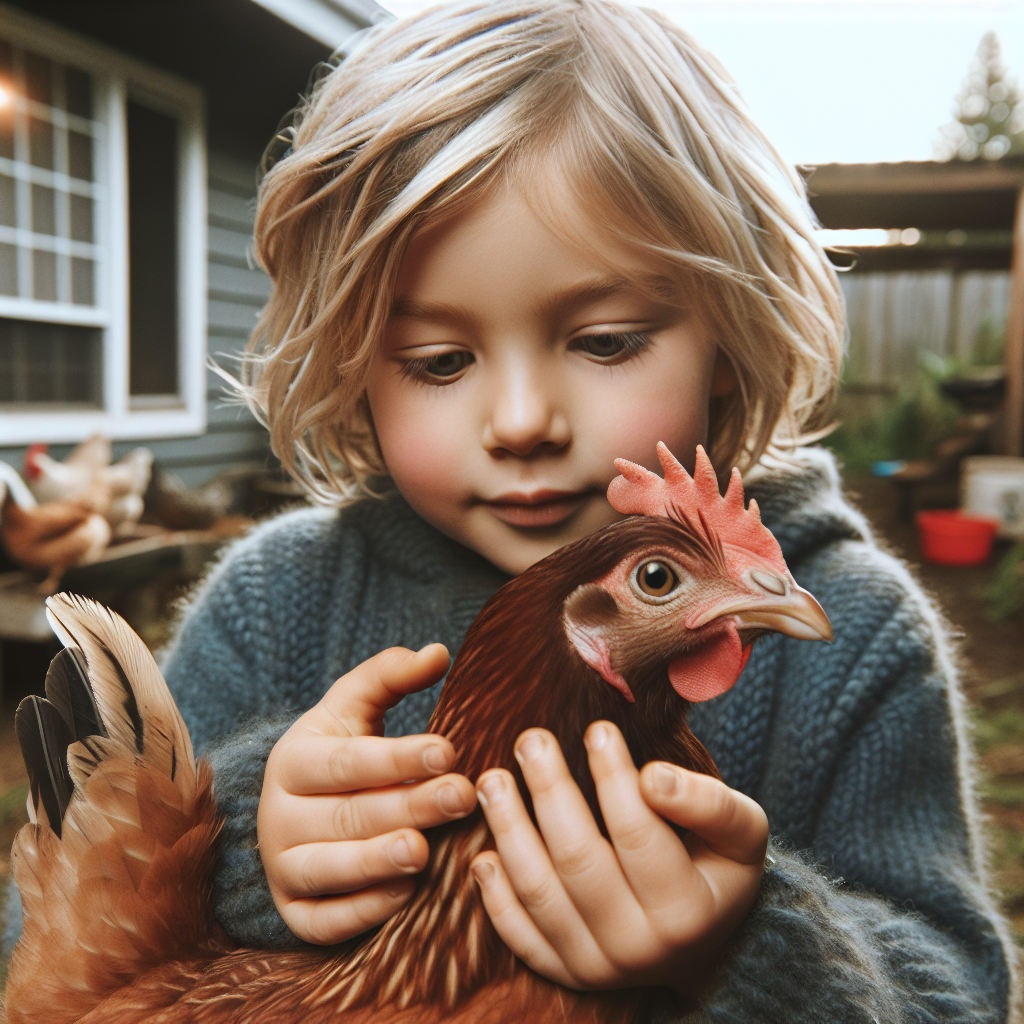Are you a proud backyard chicken raiser? If so, you may be wondering if there are any special care recommendations for your feathered friends in different seasons. From keeping them cool in the scorching summer heat to protecting them from the cold winter chill, it’s essential to understand how the changing seasons can affect your backyard-raised chickens. In this article, we will explore whether there are specific seasonal care recommendations that you should consider to ensure the health and well-being of your beloved flock. So let’s dive right in and discover how you can provide the best care for your chickens all year round.
Summer Care
Provide Ample Shade
During the hot summer months, it is crucial to ensure that your backyard chickens have access to plenty of shade. Direct sunlight for prolonged periods can lead to heat stress and even heatstroke in these feathered friends. You can achieve ample shade by providing natural shade from trees or by setting up structures such as umbrellas or awnings in their outdoor areas. Additionally, planting shrubs or installing shade cloths can help create a cooler environment for your chickens.
Ensure Proper Ventilation
Proper ventilation is essential for keeping your chickens cool and comfortable during the summer heat. Good airflow helps reduce moisture buildup and prevents the coop from becoming a breeding ground for bacteria and parasites. Make sure that there are enough windows and vents in the coop to allow for fresh air circulation. Consider using fans or providing additional ventilation options to regulate the temperature inside the coop, especially during heatwaves.
Offer Fresh Water Regularly
Water is a vital resource for chickens, especially during hot weather. It is crucial to provide fresh and clean water to keep them hydrated. The heat can cause water to evaporate quickly, so make sure to check water levels frequently and refill as needed. Adding ice cubes to their waterers can also help keep the water cool. Remember to clean and sanitize their water containers regularly to prevent the growth of harmful bacteria.
Manage Heat Stress
Chickens are susceptible to heat stress, which can lead to serious health issues. You can help manage heat stress by providing additional cooling methods. Consider using misters or placing shallow pans of water in shaded areas for chickens to wade in. Another option is to freeze water bottles and place them in the coop or run for chickens to lean against and cool down. Monitor their behavior closely for signs of distress, such as heavy panting or lethargy, and take immediate action to cool them down if necessary.
Watch for Parasites
Summer brings about an increase in parasites, such as mites and fleas, which can cause discomfort and even transmit diseases to your chickens. Regularly inspect your chickens for any signs of infestation, such as excessive scratching or feather loss. Use appropriate parasite control methods, such as dusting powders or natural remedies, to keep these unwanted visitors at bay. Clean and disinfect the coop and nesting areas regularly to prevent the buildup of parasites.
Adjust Feeding
In hot weather, chickens may have a decreased appetite due to the heat. Adjust their feeding schedule accordingly and provide high-quality, easily digestible feed to meet their nutritional needs. Consider incorporating fresh fruits and vegetables into their diet as well, as these can provide additional hydration. Avoid feeding them heavy grains in the summer, as these can generate extra heat during digestion.
Protect from Predators
Predators can pose a threat to your chickens year-round, but they may be more active during the summer months. Ensure that your coop and outdoor areas are secure and predator-proof. Repair any holes or gaps in fences, reinforce doors and windows, and use sturdy hardware cloth to cover openings. Consider using motion-activated lights or predator deterrent devices to deter potential threats. Remain vigilant and monitor your chickens’ safety regularly.
Fall Care
Prepare for Temperature Changes
As the temperatures start to cool down in the fall, it’s essential to prepare your chickens for the changing weather. Ensure that the coop is well-insulated and draft-free to provide warmth. Consider using straw or wood shavings as bedding material to provide additional insulation. Make sure that there are no drafts or leaks in the coop that could let in cold air. If necessary, use heat lamps or other heating sources to maintain a comfortable temperature.
Maintain Coop Cleanliness
With falling leaves and increased moisture, it’s crucial to maintain cleanliness in the coop during the fall. Remove any wet or soiled bedding promptly to prevent the buildup of bacteria and mold. Regularly sweep away fallen leaves from the coop and run to prevent moisture retention and potential pest issues. A clean coop not only promotes the health and well-being of your chickens but also reduces the risk of respiratory issues and other diseases.
Adjust Feeding
Fall brings about changes in the availability of forage and natural food sources for chickens. Adjust their feeding regimen accordingly to ensure they receive a balanced diet. Gradually transition from a summer feed, which may have higher protein content, to a fall feed that contains more carbohydrates for energy. You can also supplement their diet with kitchen scraps or forage that is safe and suitable for chickens.
Watch for Common Diseases
Fall is a season when certain diseases, such as respiratory infections, become more prevalent among chickens. Keep a close eye on your flock for any signs of illness, such as coughing, sneezing, watery eyes, or decreased egg production. If you notice any abnormal symptoms, consult with a veterinarian and take necessary precautions to prevent the spread of the disease to the rest of your flock.
Maintain Proper Lighting
As daylight hours decrease in the fall, it’s important to maintain proper lighting in the coop to support egg production. Artificial lighting can help compensate for the shorter days and keep your chickens laying consistently. Use timers to ensure that the coop has adequate light for 14-16 hours a day. Make sure the lighting is not too dim or too bright, as it can affect the chickens’ overall health and behavior.
Be Mindful of Daylight Changes
Fall brings about significant changes in daylight hours and may disrupt the chickens’ natural biological rhythms. Monitor their behavior and make adjustments as needed. Gradually adjust their routine to align with the changing sunrise and sunset times. It’s important to maintain a consistent schedule for letting them out of the coop in the morning and closing them in at night to ensure their safety.
Consider Molting
Molting is a natural process in which chickens shed old feathers and grow new ones. Fall is a common time for molting to occur. During this period, chickens may experience a decrease in egg production and appear less active. Provide your molting chickens with a high-protein diet to support feather regrowth, such as a feed mix with increased protein content or offer additional protein-rich treats like mealworms or sunflower seeds.
Winter Care
Provide Adequate Shelter
Winter can bring harsh weather conditions, including low temperatures, snow, and wind. It is crucial to provide your chickens with adequate shelter to protect them from these elements. Ensure that the coop is insulated and able to retain heat. Consider using deep bedding, which provides additional insulation and warmth for your flock. Use weatherproof materials, such as plastic sheeting or tarps, to cover the coop windows and block drafts.
Prevent Frostbite
Frostbite is a common concern during winter, particularly for chickens’ exposed combs and wattles. To prevent frostbite, apply a thin layer of petroleum jelly or a similar protective ointment to these vulnerable areas. Consider using coop heaters or heat lamps, but always prioritize safety and fire prevention. Avoid using heat sources that may pose a fire hazard or lead to dangerous conditions for your chickens.
Insulate the Coop
Proper insulation is crucial to keep the coop warm and comfortable during winter. Insulating the walls, ceiling, and floor of the coop helps retain heat and prevents drafts. Use insulating materials such as foam board or straw bales to create a barrier against the cold. Ensure ventilation is still maintained, but place coverings over vents or use adjustable vents to control airflow and prevent cold drafts.
Adjust Feeding
Winter brings colder temperatures, which can increase chickens’ energy needs to maintain body heat. Adjust their feeding regimen to provide additional calories and nutrients. Offer a high-quality layer feed that contains extra protein and fat to support their energy requirements. Consider providing warm treats such as cooked grains or vegetables to provide comfort and additional warmth.
Ensure Access to Water
Water is essential for chickens, even during winter. However, freezing temperatures can make it challenging for them to access water. Prevent water from freezing by using heated waterers or placing a small submersible heater in the water container. Check water sources regularly to ensure they are functioning properly and not frozen. Provide additional warmth to the coop to prevent water containers from freezing too quickly.
Manage Ventilation
While it’s crucial to insulate the coop during winter, it’s equally important to maintain proper ventilation. Poor ventilation can lead to moisture buildup, which can cause respiratory issues and promote the growth of harmful bacteria. Use adjustable vents or windows to control airflow without causing drafts. Monitor the humidity levels inside the coop and adjust ventilation accordingly to maintain a healthy environment for your chickens.
Protect from Predators
Predators are still a threat during the winter months, and hunger may drive them to seek out your chickens. Ensure that the coop and run are predator-proof and secure. Check for any signs of potential entry points, such as loose wires or gaps, and promptly address them. Install motion-activated lights or noise deterrents in the vicinity to deter predators and protect your flock.
Spring Care
Prepare for Temperature Fluctuations
Spring is a season of fluctuating temperatures, so it’s important to prepare your chickens for these changes. Monitor the weather forecast and be ready to make adjustments accordingly. Ensure your chickens have access to both sheltered areas and sunny spots in their outdoor space. Be prepared to temporarily confine them in the coop during inclement weather to protect them from harsh conditions.
Clean and Inspect Coop
Spring is a great time to thoroughly clean and inspect the coop after the winter season. Remove any remaining debris or soiled bedding from the winter. Scrub and disinfect the coop to eliminate bacteria and parasites that may have accumulated. Inspect the structural integrity of the coop, including the roof, walls, and windows. Repair any damage or leaks to ensure the coop is secure and safe for your chickens.
Adjust Feeding
Spring brings about an abundance of forage and natural food sources for chickens. Adjust their feeding regimen to gradually decrease the amount of supplemental feed provided. Allow your chickens to spend more time foraging for insects, worms, and fresh greens. However, ensure they still have access to a well-balanced layer feed to meet their nutritional requirements.
Watch for Signs of Respiratory Issues
Springtime can bring about respiratory issues among chickens due to fluctuating temperatures and increased humidity. Keep an eye out for any signs of sneezing, coughing, or abnormal breathing. Ensure proper ventilation within the coop to avoid excessive moisture buildup. Consult with a veterinarian if you notice any persistent respiratory symptoms in your flock.
Promote Healthy Foraging
Spring is a great time for chickens to engage in natural foraging behaviors. Encourage and promote healthy foraging by providing areas where they can scratch and peck for insects and plants. Allow access to a separate section of your garden where they can help with pest control and weed management. However, be mindful of toxic plants and keep chickens away from them to prevent potential health issues.
Monitor Egg Production
As spring approaches, hens tend to increase their egg production. Monitor the number and quality of eggs your chickens lay. Healthy hens in the prime of their laying ability should produce eggs consistently. Sudden changes in egg production or abnormal shells may indicate underlying health issues. Monitor their behavior and consult with a veterinarian if necessary.
Manage Broodiness
Springtime can trigger broodiness in some chicken breeds. Broodiness is a strong maternal instinct where hens attempt to incubate and hatch eggs. While broodiness is natural, it can impact egg production and flock dynamics. If you don’t want your chickens to hatch eggs, you can break their broodiness by removing any eggs they attempt to sit on and providing cool and comfortable environments to discourage nesting behaviors.
Year-Round Care
Maintain Cleanliness
Regardless of the season, proper coop cleanliness is crucial for the health and well-being of your chickens. Regularly remove soiled bedding and clean the coop to prevent the buildup of bacteria and parasites. Keep nesting areas clean and ensure fresh bedding is provided. Regularly inspect and sanitize their water containers, feeders, and any other equipment used in their care.
Provide Nutritious Diet
Offering a nutritious diet throughout the year is essential for the overall health and productivity of your flock. Provide a balanced layer feed that meets their nutritional needs. Supplement their diet with fresh fruits, vegetables, and kitchen scraps that are safe for chickens. Ensure access to clean water at all times and monitor their intake to avoid any dehydration issues.
Monitor Water Quality
Water quality is important for the health and hydration of your chickens. Regularly check the water containers for cleanliness and ensure they are free from algae or other contaminants. Clean and refill the water containers daily to prevent bacterial growth. Consider using waterers with a filtration system or adding apple cider vinegar to the water to improve water quality and support digestion.
Regularly Check for Parasites
Parasites can affect chickens at any time, so it’s important to regularly check for signs of infestation. Inspect your chickens for mites, lice, or other external parasites, particularly around their vent area and under their wings. Treat infestations promptly using appropriate methods or consult with a veterinarian for guidance. Regularly clean and disinfect the coop and nesting areas to prevent parasite buildup.
Examine Egg Production
Monitoring egg production is an important year-round task. Keep track of the number of eggs your chickens lay to identify any changes or abnormalities. Sudden decreases in egg production or unusual shell quality may indicate underlying health issues or stress. Monitor the size, shape, and color of eggs as well, as these can provide insights into their overall well-being.
Observe Behavioral Changes
Chickens have distinct personalities and behaviors, so it’s important to observe any changes in their behavior. Monitor their interactions, activity levels, and social dynamics. Any sudden changes in behavior, such as aggression or lethargy, may indicate underlying health issues or stress. Address any behavioral concerns promptly to maintain a harmonious flock.
Address Health Issues Promptly
It’s important to address health issues promptly to ensure the well-being of your chickens. Regularly check your flock for any signs of illness, such as changes in appetite, abnormal droppings, or unusual behavior. If you notice any concerning symptoms, consult with a veterinarian who specializes in poultry health. Prompt diagnosis and treatment can prevent further complications and promote a healthy flock.
Conduct Coop Maintenance
Regular coop maintenance is crucial for the safety and comfort of your chickens. Inspect the coop regularly for any signs of damage, wear, or potential hazards. Repair or replace any broken or rotting materials promptly. Keep the coop clean, ensure proper insulation, and maintain ventilation systems. Regular maintenance helps prolong the lifespan of your coop and provides a secure environment for your flock.
Protect from Predators
Predators are a constant threat to backyard chickens, so it’s important to take measures to protect them year-round. Regularly inspect the coop and run for any vulnerabilities or signs of attempted intrusions. Reinforce fencing, cover any gaps, and use predator-proof materials to prevent access. Consider using motion-activated lights, alarms, or guard animals to deter potential predators and keep your flock safe.
Practice Biosecurity Measures
Biosecurity measures are essential for preventing the introduction and spread of diseases among your flock. Limit access to your coop and run to authorized personnel only. Disinfect your footwear and hands before and after handling your chickens or entering their living area. Avoid sharing equipment, such as feeders and waterers, with other poultry owners. Quarantine new birds before introducing them to your existing flock to prevent the spread of potential diseases. Adhering to biosecurity practices helps maintain a healthy population of chickens and prevents disease outbreaks.
By following these comprehensive guidelines for seasonal care and year-round maintenance, you can ensure the health, happiness, and productivity of your backyard-raised chickens. Each season presents its own unique challenges and considerations, but with proper attention and care, you can provide the best possible conditions for your feathered friends throughout the year. Happy chicken keeping!




